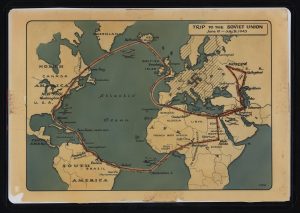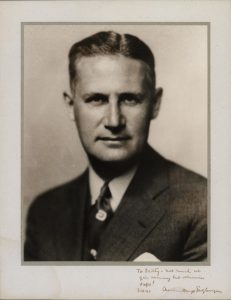Main Exhibit Page | Humble Beginnings | The University of Illinois | A Young Man on the Rise | The Dumbarton Oaks Conference and Senator Vandenberg | Credits and Exhibit Sources

Found in RS 26/20/120, Reston Diary

Found in RS 26/20/120, Framed Photographs and Awards
Arthur Hays Sulzberger
In December 1940, Scotty received a dinner
invitation from the Sulzbergers, who hoped Scotty would enlighten them about his experiences in London. Scotty did more than recount what he saw over seas: he passionately advocated for American assistance to Britain, much to the ire of the other guests. Mrs. Sulzberger left the dinner impressed by Scotty’s intellect and forthrightness. She would not soon forget this promising young man.[1]
This was not the case for Arthur Hays Sulzberger, known among his colleagues as AHS. The two men would not meet again until 1942 when Scotty was on loan from the Times to the Office of War Information (OWI). OWI had assigned Scotty to Ambassador John Winant in London when AHS visited the embassy to inquire about American propaganda efforts. Winant summoned Scotty to provide the report, although AHS had no recollection of having met the young reporter previously. Winant had to remind AHS that Scotty was his employee, much to AHS’ embarrassment. Nevertheless, ASH recognized Scotty’s talent and offered him a position as his administrative assistant, which Scotty immediately accepted. [2]
Trip to Russia
The position afforded Scotty the opportunity to delve further into world affairs. When AHS began making preparations to visit Russia as a representative of the American Red Cross to determine how American aid was helping the Soviet Union withstand the Nazi invasion, Scotty jumped at AHS’ offer to accompany him on the journey. When they arrived in Moscow on June 21, 1943, Scotty and AHS could not help but admire the Russian people’s tenacity, yet the government’s treatment of citizens appalled them.[3] In one instance, AHS and Scotty visited a train carrying wounded soldiers to Moscow and were horrified to discover that military officials delayed unloading the troops until AHS inspected each train car. AHS ordered the officials to discharge the men, but the Soviets demanded ASH first inspect the train. “Don’t let this make a communist out of you!” ASH sarcastically told Scotty afterward.[4]
Washington Bureau
Scotty requested a transfer to the Times’ Washington Bureau in the winter of 1944, not content as an administrative assistant. AHS granted his protégés request,[5] yet Scotty’s future was not assured. He would now be working under Arthur Krock, the Times venerable Washington Bureau Chief, who vehemently opposed Scotty’s approach to journalism. While Scotty wanted newspapers to provide an analysis of events, Krock adhered to the tradition of a newspaper’s primary duty as recording events. As a result, Scotty soon found himself consigned to covering foreign embassies. Although Krock revived Scotty’s dread of being an outsider,[6] the upcoming Dumbarton Oaks conference, and a budding relationship with Senator Vandenberg, would alter his fortunes.

Found in RS 26/20/120, Reston Diary

Found in RS 26/20/120, Reston Diary
Continue to:
Dumbarton Oaks and Senator Vandenberg, 1944-1953
Footnotes
[1] John F. Stacks, Scotty: James B. Reston and the Rise and Fall of American Journalism (Boston: Little, Brown, 2003), 65-66.
[2] Ibid, 76-77; “Tape Recorded Interview with James Reston, June 12, 1978, 1935-1995; Record Series 26/20/120, University of Illinois Archives.
[3] Stacks, Scotty, 79, 83-86.
[4] James Barrett Reston, Reston Diary, July 3, 1943, James B. Reston Papers, 1935-1995; Record Series 26/20/120, University of Illinois Archives.
[5] Arthur Krock to Arthur Hays Sulzberger, March 13, 1944, James B. Reston Papers, 1935-1995; Record Series 26/20/120, Box 23, Folder: AHS-Job Negotiations 1942, 1944, 1946-47, University of Illinois Archives; Arthur Hays Sulzberger to James Reston, April 12, 1944, James B. Reston Papers, 1935-1995; Record Series 26/20/120, Box 23, Folder: AHS-Job Negotiations 1942, 1944, 1946-47, University of Illinois Archives.
[6] Stacks, Scotty, 89-90, 92, 94.; James Reston, Deadline: A Memoir (New York: Random House, 1991), 135.